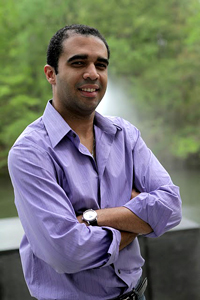Brewing bio-fuel
Brewing bio-fuel

The jatropha curcas is a lowly plant, a survivor, a leafy, poisonous species that flourishes in conditions in which many food crops wouldn’t even germinate.
And it may help save the planet.
So hopes Vladimir De Delva, a senior chemical engineering major whose plans for a biodiesel business built on seeds from the jatropha curcas won Rowan University’s 2011 William G. Rohrer Business Plan Competition.
De Delva, 24, who hails from Petionville, Haiti and is returning to his island home following commencement May 13, believes a biodiesel business based on seeds of the jatropha plant has tremendous potential. He sees it not only as a native fuel source on Haiti but an engine to create as many as 600 good, year-round jobs in one of the poorest nations in the world.
De Delva believes his idea to build a biodiesel plant in Haiti is especially strong because the island, which is still recovering from a devastating 2010 earthquake, has vast stretches of land with ideal conditions on which to grow jatropha.
“The plant requires semi-arid conditions and there it flourishes,” said De Delva, who has been producing 35-gallon batches of biodiesel from the plant in his parents’ backyard for about three years.
He said the fuel is a high-grade biodiesel that runs the family’s back-up generators when power goes out. His plan is to expand his small-scale operation to one or more commercial production plants.
Outside the U.S., he said, jatropha is well-known and the oil from its seeds are already being converted to biodiesel in India, Africa and Southeast Asia.
De Delva said through a process known as transesterification, which converts raw vegetable oil to biodiesel, his operation could produce about 130 gallons of fuel per acre per year and his plan calls for the acquisition of about 3,700 acres in the first phase.
Miracle plant?
De Delva said jatropha begins producing harvestable fruit within one year of planting, reaches maturity in two years, and will live and produce fruit for 50 years or more.
“Jatropha grows without pesticides, has a natural bug repellant, and grows like weeds in Haiti,” De Delva said.
Further, he said, high quality charcoal can be made with by-products of the biodiesel production and that can help ease the destruction of Haitian forests for cooking fuel.
“With 6,000 acres I could produce about a million gallons of biodiesel a year,” De Delva said. “Haiti imports about 127 million gallons of diesel now – which is a lot for such a small, poor country. But there’s a huge market and if we could produce it in Haiti, and provide jobs, people would buy it.”
The Competition
De Delva, who conceived his plan for a biodiesel business several years ago, said the Business Plan Competition, which began during the fall semester and concluded in April, was an arduous process that consumed so much time and strategizing he almost dropped out.
“I am a Rowan chemical engineering major and I already have a lot of work to do," he said. "The competition took a lot of my time but now that it’s over I don’t regret it for a minute.”
As the first place winner De Delva won $5,000, more than half of which he’ll use to get samples of his biodiesel certified by a German lab. The remaining money he plans on using to register his company in Haiti.
Dr. Robert D’Intino, a Rowan Professor of Entrepreneurship and Management and Coordinator of the Entrepreneurship Program, said despite an already heavy workload - Rowan’s Chemical Engineering program is ranked second in the nation - De Delva took four entrepreneurship classes through the College of Business.
“It isn’t like Vladimir sat down one day and wrote a bus plan,” Dr. D’Intino said. “He’s been working on this for three years or more and I believe he will build this plant.”
Dr. D’Intino said about 80 students submitted 15-page feasibility plans in the first phase of the competition last fall and a team of external judges narrowed the field to 20. The top 20 plans were further narrowed to five during a subsequent review and those five presented full plans for the competition in April.
He described De Delva’s plan as having “scope and scalability” that could be expanded beyond Haiti to the Dominican Republic.
“He could, potentially, have a whole chain of these production plants,” Dr. D’Intino said.
The second place winner of the Business Plan Competition, which began at Rowan in 2007, was Davey Sammons, an entrepreneurship major from Bordendown, for Sammons Motorsports, a service-oriented business that rebuilds racing shocks. The third place winner was George Toso, an entrepreneurship major from Millville, whose start-up txt2Text would enable computer users to replace their keyboard and mouse.
De Delva, who has already landed an engineering job in Haiti with a rum producer upon graduation, said he seeks to develop his biodiesel business over the next several years.
“I think of it as social entrepreneurship,” he said. “As a chemical engineer I can always make money. This is about making money and helping people. I’m actually more interested in the helping people part.”